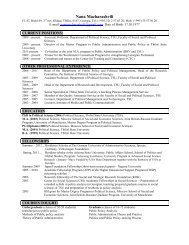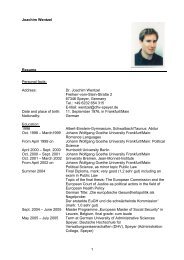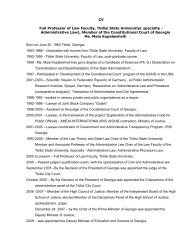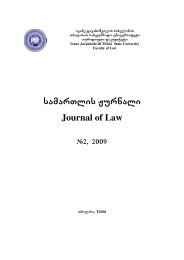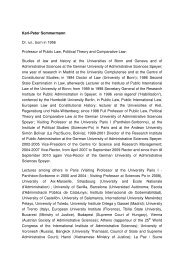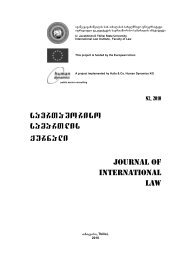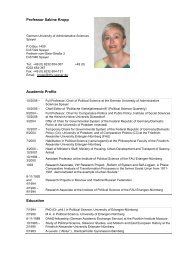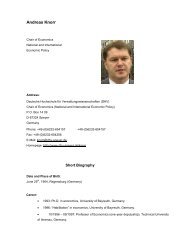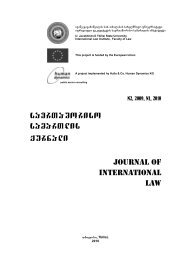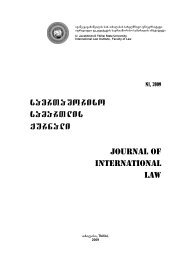Untitled
Untitled
Untitled
You also want an ePaper? Increase the reach of your titles
YUMPU automatically turns print PDFs into web optimized ePapers that Google loves.
saerTaSoriso samarTlis Jurnali, #1, 2008 JOURNAL OF INTERNATIONAL LAW, N1, 2008<br />
its boat or crew members in illegal activities in<br />
this zones is a good reason for the coastal<br />
State to exercise the hot pursuit.<br />
In ‘the Araunah’ case the British Government<br />
noted that, although, the Canadian fishing<br />
vessel was not in the territorial sea and<br />
was not participating in illegal fishing, its detention<br />
was justified because its sailors entered<br />
in the territorial sea of Russia by the<br />
boats and were fishing. 51<br />
A Persuing ship may take any necessary<br />
and reasonable measure to detain the guilty<br />
ship. However, each country establishes its<br />
own regulations regarding the procedure of<br />
detention of a guilty ship and person within<br />
the scopes of its jurisdiction. 52 On the other<br />
hand the compensation for any damage<br />
caused as a result of illegal pursuit or illegal<br />
use of force is established. 53<br />
Some authors deem that, the right of hot<br />
pursuit is a privilege 54 which is granted to the<br />
coastal State in case of violation of double<br />
obligations by the offender ship. First, when<br />
ship violates the local laws, and the second<br />
when it refuses to surrender to local competent<br />
authorities. 55<br />
While it is hot pursuit and it continues on<br />
the high sea the issue of its conclusion does<br />
not depend on time and place. But if there is<br />
no special entitling agreement, the pursuit<br />
shall end when the pursued ship crosses the<br />
outer boarder of the territorial sea of any State<br />
other then the persuing State. 56<br />
Article 111.3 of the Convention strictly<br />
determines that the hot pursuit ceases and<br />
not temporarily terminates when the ship pursued<br />
enters the territorial sea of any other<br />
State. In other words perusing ship shall not<br />
have a right to wait when the pursued ship<br />
leaves the territorial sea. 57<br />
Pursuit may be exercised only by a warship<br />
or an aircraft or a specially authorized<br />
ship for these purposes (ships of coast<br />
guards). Location of the pursued vessel for<br />
the moment of commencement of pursuit is<br />
less important, as it is not necessary for it to<br />
be in the territorial sea or the contiguous zone<br />
for the moment of commencement of pursuit.<br />
CONCLUSION<br />
The Convention managed to establish<br />
more or less acceptable, universal regime for<br />
everyone, when the territorial sovereignty of<br />
coastal State on the one hand, and freedom<br />
of navigation on the other hand are balanced.<br />
As it is noted in the commentary of the USA, it<br />
establishes the balance between the coastal<br />
and maritime interests with respect to all maritime<br />
zones. 58<br />
First of all this balance has ensured popularity<br />
of the Convention both in developed<br />
and developing States. This once again is<br />
proved in the address of the US President to<br />
the Senate, where it is noted that, The United<br />
State has a basic and long term national interest<br />
in the oceans and gradually came to<br />
the opinion that complete protection of this<br />
interests can be best achieved by universally<br />
recognized international frame agreement,<br />
which manages the application of the seas. 59<br />
The convention has introduced new Articles<br />
that have significantly extended the jurisdiction<br />
of the coastal State not only in the internal<br />
waters and the territorial seas, but also<br />
in other maritime zones. In particular, the norms<br />
relating to the protection of maritime environment<br />
is implied. Traditional scope of jurisdiction<br />
of the coastal State, mainly limited with<br />
criminal law jurisdiction, has been significantly<br />
extended with the jurisdiction of environmental<br />
protection. Moreover, it may be easily said<br />
that exactly this area is the most unified and<br />
effective among all jurisdictions exercised by<br />
the coastal States.<br />
And finally the Convention not only grants<br />
the coastal States the jurisdiction over the<br />
maritime zones, but gives an opportunity to<br />
actually execute this jurisdiction, in particular<br />
by granting the right of hot pursuit.<br />
1<br />
Implied the date of signature of the UN Convention on the Law of the Sea.<br />
2<br />
Please see ”A Constitution for the Oceans” Remark by Tommy T.B. Koh, of Singapore,<br />
President of the Third United Nations Conference on the Law of the Sea.<br />
3<br />
Hereafter “Convention”.<br />
4<br />
Please see. Bernaert’s Guide to the 1982 United Nations Convention of the Law<br />
of the Sea, Arnd Bernaerts, Trafford Publishing, 2006. p. 9.<br />
98



